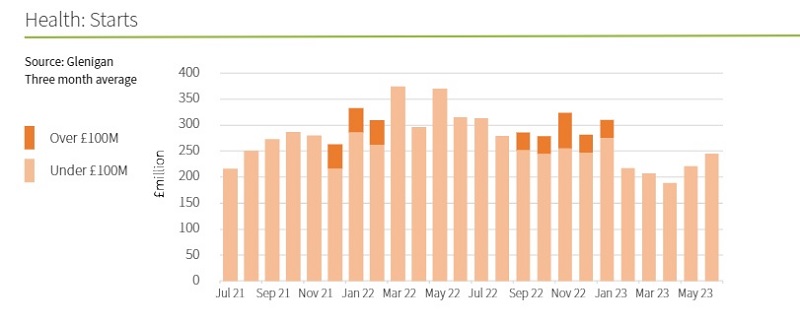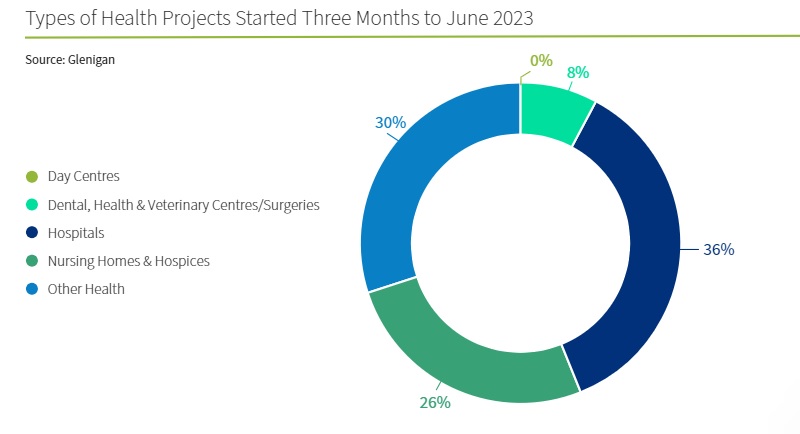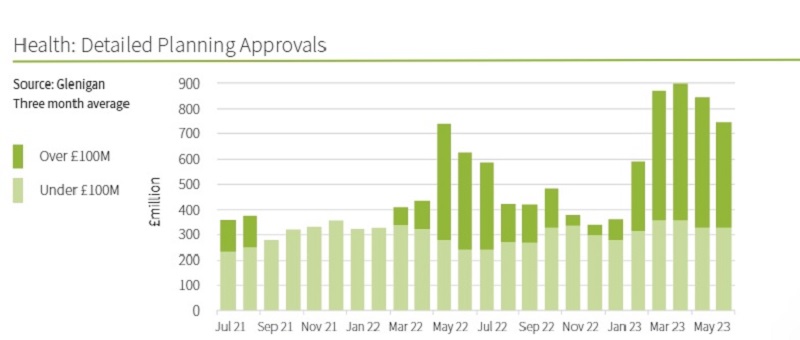The healthcare construction sector is continuing to feel the effects of interest rate hikes, rising inflation, and supply chain problems, according to the latest report from industry leader, Glenigan.
In its July Construction Review, which reflects activity in the three months to the end of June this year, the report reveals that main contract awards in the health sector decreased against the previous three months and compared to a year ago.
More positively, however, project starts grew on the previous quarter and detailed planning approvals were higher than a year ago.
While there are small signs of recovery in the long term, with positive private housing starts an example of stabilising conditions in some verticals, consumer and investor confidence still remains low, generally stifling activity in the here and now
And, adding up to £736m, underlying health work starting on site (less than £100m in value) during the three months to June grew 50% against the preceding three months on a seasonally-adjusted (SA) basis, but stood 22% down against the previous year.
Overall, health project starts increased 18% against the previous quarter, but fell 22% on a year ago.

The report also reveals:
- Totalling £704m, health main contract awards were down 49% against the preceding quarter and 44% against a year ago
- Major projects, at £106m experienced an 84% decrease against the previous quarter, but increased 6% on the previous year
- Underlying contract awards experienced a poor performance, decreasing 15% against the preceding quarter to stand 48% down against the previous year to total £598m
- Detailed planning approvals, totalling £2,239m, experienced a 14% decline against the preceding quarter, but grew 19% on the previous year
- Major project approvals, totalling £1,258m, slipped back 18% against the previous quarter, but stood 8% down on a year ago
- Underlying approvals at £981m experienced a 12% growth compared with the preceding three months to stand 37% up on a year ago
Hospitals account for the most construction activity
As usual, hospitals accounted for the greatest proportion (36%) of health work starting on site during the three months to June, despite the value falling 33% against the previous year’s levels to total £265m.
Nursing home project starts also performed poorly during the period, falling 46% against the previous year to total £191m, which accounted for 26% of starts.
Top contractors in the sector were Bouygues UK with three projects worth £337m; Balfour (three projects worth £324m); and Tilbury Douglas with 14 projects worth £299m.
Once again, the Department of Health and Social Care topped the client table, with 190 projects worth £1.63bn. Second was the Welsh Government, with two projects totalling £562m; and University College London, with two projects worth £101m.
The downturn in activity reflects the construction industry as a whole, with the report revealing a 1% decline in detailed planning approvals against last year across all sectors.
There was also a reported 30% fall in main contract awards, and a 42% decline in project starts against 2022 levels.
Commenting on the figures, Glenigan’s economic director, Allan Wilen, said: “The construction industry continues to be buffeted by strong headwinds with little sign these are going to calm down in the near future.
“As our latest forecast shows, the next six months will likely be turbulent ones.
“Upcoming interest rate hikes will further hinder projects moving to site and we are already seeing work falling back in the civil engineering sector with marked declines in both infrastructure and utilities.
“While there are small signs of recovery in the long term, with positive private housing starts an example of stabilising conditions in some verticals, consumer and investor confidence still remains low, generally stifling activity in the here and now.”


